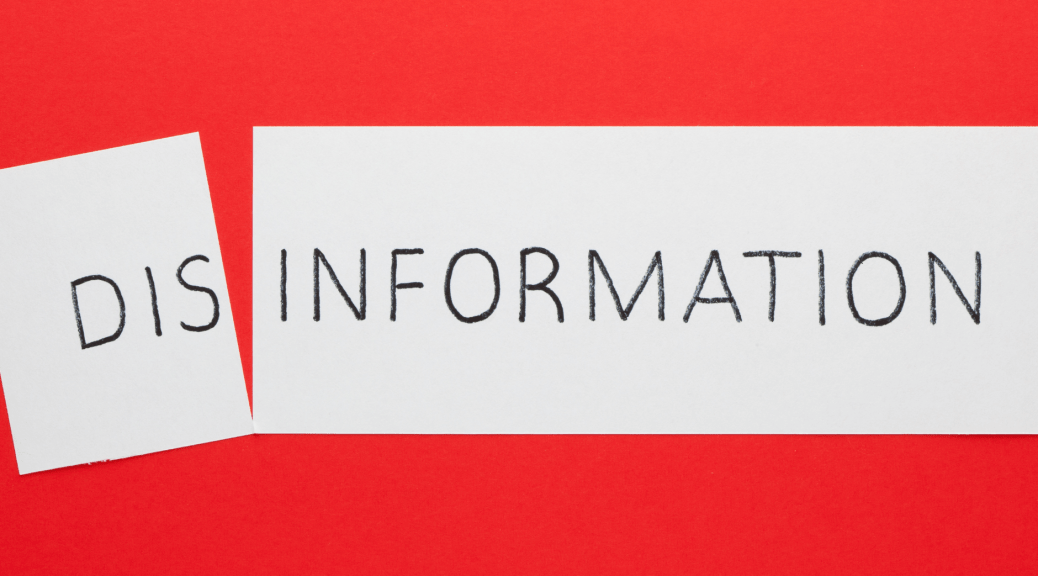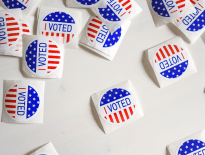
Persisting Against Disinformation in the Post-Election Era
EDITOR’S NOTE: I am thankful to have met this week’s guest blogger, Lee McIntyre, at a conference a few years back. Considering he’s way too modest in his author’s bio at the end of this guest post—he’s literally written the book on Post-Truth, and has spoken to the United Nations on the subject—I was thrilled that he agreed to offer us some post-election advice on how and why it’s important to keep speaking up against disinformation, and how to distinguish that from run of the mill lying. If you’ve been following along, you’ll notice that his piece follows nicely on other things I’ve been discussing here, especially my piece on public gaslighting from a few weeks back. Enjoy! Cheers, DS Leiter, Founder, Assertive Spirituality
by Lee McIntyre, Guest Blogger
Throughout the Trump presidency we’ve seen a shocking amount of misinformation and disinformation, on topics ranging from the mundane (“there were more people at my inauguration than at Obama’s”) to the world-shattering (“Russia did not interfere in the 2016 election.”). In my 2018 book POST-TRUTH, I discuss the dangers of this kind of “political subordination of reality.” Post-truth goes beyond mere lying, spin, or partisanship, and is instead a tactic drawn from the authoritarian toolbox, meant to assert control over the narrative of truth and reality, in anticipation of an assertion of power over the population.
The Goal of Post-Truth
It is important to remember that even though lying is an important tactic used by many politicians, with post-truth the goal is not merely to convince someone that a falsehood is true, but to so “dominate their reality” that they begin to question whether it’s possible to know what’s true or false outside a political context.
Trying to convince someone—even when you are giving them false information—offers at least a certain type of respect, because it admits that you care about the cognitive consent of the person who is being lied to. With post-truth, the ploy is instead to say “I am the boss so I get to frame reality in any way I like, and there is nothing you can do about it.”
The point is domination, not persuasion.
Negative Outcomes=(Even More) Cynicism
The result is that the population becomes more cynical, perhaps believing that since there is really no way to know the truth, one might as well believe whatever lie is being manufactured by one’s leader.
Given the context of his presidency, it came as no shock whatsoever during the 2020 election that Trump continued his massive campaign of “post-truth” lying and distortion.
The Difference Between Misinformation and Disinformation
There is an important distinction to be made here between misinformation and disinformation. Misinformation is information that is merely false, but disinformation is information that is intentionally false. Such lies are created on purpose, normally with a political, economic, or ideological goal in mind.
Thus the challenge during a political campaign is to sort between claims that are merely hyperbolic and those that have been created to dominate your reality.
Dirty Tricks and Disinformation: How It Works
A single example will suffice. In a 2018 Congressional campaign in New York, the Republican incumbent Lee Zeldin created flyers which said that the deadline for absentee ballots was November 6th, whereas the actual ballot was due no later than November 5th. This had the consequence of causing many students (who were more likely to vote for the Democrat) to miss the deadline. Zeldin kept his seat, and denied all wrongdoing, even though it later came out that he’d made the same “error” in 2016. This is a textbook example of a disinformation campaign, which was created for the express purpose of depressing Democratic turnout.
During the 2020 election, we saw a much wider disinformation campaign, during which President Trump desperately tried to push the narrative that virtually all absentee ballots (which were favored by Democrats) were fraudulent.
Now that we are in the post-election period—with Joe Biden and Kamala Harris on their way to the White House—one might think that it doesn’t matter so much how to deal with this kind of “dirty trick” anymore. Let the liars embarrass themselves. What can it hurt?
Plenty.
Why Should We Worry About All This Now That Trump Is Leaving?
In the post-election period, Trump has continued his bogus claims of voter fraud, which has the potential to undermine faith in one of the most basic pillars of Democracy, hobble Biden’s transition, and perhaps even endanger national security.
Even so, it is important to remember that context matters.
To claim that—due to widespread voter fraud—the Republican-controlled Michigan state legislature should install its own slate of electors (rather than one based on the will of the voters) is a pathetic, anti-American power play.
How seriously should we take it? That depends on the electoral context.
The Stakes Are Still High
Is there is chance that this could happen?
Yes, and given our Constitution it would be perfectly legal. In a national environment in which Biden and Harris have already been declared the winners, and are in the middle of their transition, it might seem less important to push back.
But I think that is the wrong reaction.
Although the stakes might seem lower in a post-election environment—where misinformation and disinformation could do less damage—it’s important to remember the overall goal of post-truth: the political subordination of reality.
In a situation in which there might be grievous harm from an unlikely event, we are still wise to take it seriously.
Actuaries and statisticians make a living calculating things like the extreme unlikelihood of a nuclear meltdown multiplied by the unspeakable harm that might occur if one occurred. This is a bedrock principle of “risk analysis” and a cornerstone of rational judgment.
The Price of Silence in the Face of Lies
So let’s ask ourselves: what would be the price of losing our Democracy on the off chance that a group of Republican toadies in Michigan succeeded in making a power play that is fully allowed by the U.S. Constitution, even though most people still regard this as unimaginable or inconceivable?
In a political environment in which Trump used tear gas and rubber bullets on peaceful protestors, Mitch McConnell denied President Obama a rightful Supreme Court pick, and Republican members of the House and Senate have yet to challenge Trump’s fantasy about voter fraud, is it really inconceivable that a group of Michigan legislators might try to subvert the will of the voters if they thought that they could get away with it?
Why We Need to Keep Challenging Misinformation and Disinformation
Misinformation and disinformation must be challenged, each and every time they appear. There is no such thing as a claim that is so outrageous it need not be “dignified” by a response.
John Kerry learned this when he was “Swift-boated” by manufactured lies about his war record during the 2004 Presidential campaign. President Obama faced it when Donald Trump invented a conspiracy theory about his birthplace that dogged Obama during his entire presidency, and lead to Trump being rewarded with the presidency. If lies and falsehoods are allowed to fester, they can do great damage.
Yes, context matters in assessing risk, but in today’s supercharged political environment, any false claim—if left unchallenged—can eventually grow into something unforeseen and sinister.
At the dawn of American political history, no less a figure than George Washington learned this political lesson between his first and second terms. According to the author Ron Chernow, author of WASHINGTON: A LIFE, during his first term in office Washington was accused of all sorts of outrageous conduct, such as that he was plotting to restore the British monarchy or that he was actually a British double agent. Washington refused to respond. During his second term, however, he began to take a different tack, “realizing that if you drip water on a stone—if it drips on the stone long enough—it will leave a mark.”
The Road Ahead
No matter the context, political lies and disinformation are dangerous. In the wrong hands, when given enough repetition, even the most absurd claims can grow to threaten Democracy itself. Shall we let Trump take as long as he needs to admit that he lost the election — making baseless claims of voter fraud along the way — because he’s on his way out no matter what?
But what happens when Trump creates his own media empire, and attacks Biden throughout his first term, or perhaps decides to run again in 2024? How might our “risk matrix” look then?
If we have learned nothing else from Trump’s presidency, let it be this: resistance is a necessary tool to fight against tyranny. And sometimes it works! But we must keep an eye out too even when tyranny is not on the horizon. As with so many precious things, the price of guarding them is eternal vigilance.
About the Guest Author
Lee McIntyre is a Research Fellow at the Center for Philosophy and History of Science at Boston University. He is the author of Post-Truth (MIT Press, 2018), The Scientific Attitude (MIT Press, 2019), and numerous popular essays that have appeared in such venues as the New York Times, Newsweek, Scientific American, and the Boston Globe. His website can be found at leemcintyrebooks.com.
Looking for more resources toward speaking up for what’s right and dealing with the conflict that results?
Boy, do we have got a free “Assertive Spirituality Guide to Online Trolls” for you. It actually helps you with conflict both online and off. To get it, sign up for our email newsletter (either in the top bar or by checking the appropriate box when commenting on this article). Once you’ve confirmed your email address, we’ll send you the link to the guide in your final welcome email. You can unsubscribe at any time, but we hope you’ll stick around for our weekly email updates. This summer we’re hoping to offer more online courses and other support resources for those advocating for the common good, and if you stay subscribed, you’ll be the first to know about these types of things when they pop up.


3 thoughts on “Persisting Against Disinformation in the Post-Election Era”
I appreciate the support for confronting mis and disinformation. It feels like it’s the least we can do when we use social media.
Thank you this was very informative.
This is heartbreaking – given that it was written a week after the election and we are reading it well after January 6. The lies and disinformation continue – 700,000+ people are dead of COVID, with many continuing to refuse masking and vaccines. It is so tempting to withdraw from the debate when our elected officials seem to be more interested in power than people.